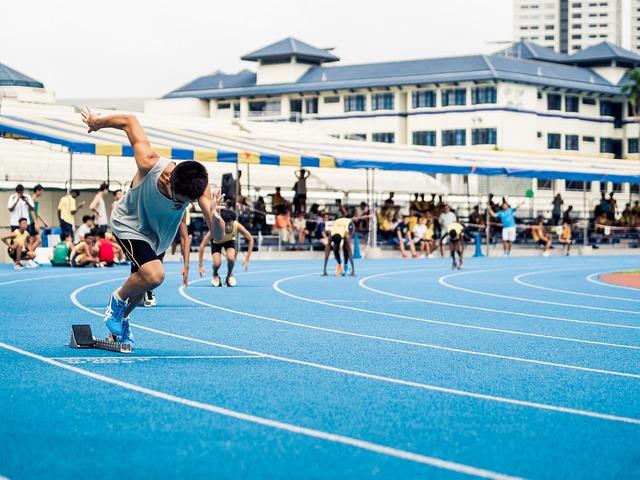Germany and Norway Dominate Lahti Staff Sprints with Unmatched Technique
In an exciting show of excellence at the Lahti Staff Sprints, Germany and Norway emerged as the dominant forces, showcasing their unparalleled tactical acumen and teamwork. the athletes executed their methods with meticulous precision, main to a seamless change of baton through the race. This systematic method not solely optimized their velocity but additionally minimized errors—parts typically decisive in such high-stakes competitions. Every nation leveraged distinctive strengths, guaranteeing that their groups have been not solely quick but additionally environment friendly.
The important thing components contributing to their success included:
Strategic Planning: Each groups performed an in depth evaluation of course situations and opponent efficiency.Staff Cohesion: The synergy between members allowed for fluid transitions and coordination.Bodily Conditioning: Rigorous coaching and planning ensured peak efficiency ranges through the occasion.
As an instance the aggressive fringe of the German and Norwegian groups, take into account the next breakdown of their common speeds through the sprints:
CountryAverage Pace (km/h)Germany27.5Norway27.2
with such meticulous consideration to element in technique and execution, Germany and Norway set a new benchmark in Lahti, leaving an enduring impression on the game and highlighting their formidable prowess on the worldwide stage.

Key Performers Shine: Highlight on Athletes Driving Staff Success
Within the thrilling environment of Lahti, Germany and Norway showcased their prowess within the crew sprints, thanks largely to standout performances from their star athletes. The German crew,led by the dynamic duo of Teresa Stadlober and Julius Fandrey,displayed a seamless technique that mixed velocity and teamwork. Their skill to learn the race allowed them to keep up the excellent tempo, finally securing a podium end that left spectators in awe. Stadlober’s explosive remaining push and Fandrey’s tactical maneuvers have been essential in navigating the difficult course, proving that their synergy and ability can shine in aggressive moments.
Norway, to not be outdone, had its personal heroes rising from the snowy backdrop. The outstanding efforts of johannes Høsflot klæbo and Therese Johaug have been pivotal of their quest for victory. Each athletes exhibited distinctive stamina and agility, successfully adapting to the race’s ebb and movement. Their contributions within the latter phases of the competitors not solely rallied their teammates but additionally energized the gang. The tactical brilliance displayed by Klæbo mixed with Johaug’s unmatched endurance set a brand new benchmark on this planet of cross-country snowboarding,echoing all through the game’s neighborhood.

Tactical Insights: Analyzing the Successful Methods of Each Groups
The thrilling crew sprints in Lahti showcased the tactical prowess of each Germany and Norway, illustrating how strategic choices and execution can result in victory. Germany’s method hinged on their robust relay transitions,enabling their skiers to preserve momentum all through the course. Key methods included:
Efficient Dialog: Seamless exchanges between teammates ensured minimal time loss.Terrain Familiarity: Skiers utilized their data of the course to optimize pacing on the assorted elevations.Vitality Administration: Athletes adeptly balanced depth and restoration, essential for the high-pressure sprints.
On the opposite hand, Norway employed a technique targeted on aggressive pacing and strategic placement throughout the pack. The effectiveness of their plan was evident in their skill to execute tactical overtakes at strategic factors on the observe.Notable parts included:
Drafting Methods: Skiers took benefit of slipstreaming to preserve power through the race.Staggered Positioning: By successfully inserting their athletes, they created obstacles for rivals trying to overhaul.Actual-Time Changes: The crew’s skill to adapt to race dynamics in real-time proved very important for pushing forward throughout vital phases.

The Position of Teaching: How Steerage Influences Efficiency in crew Sprints
The affect of teaching on efficiency throughout crew sprints can’t be overstated. Coaches serve not solely as strategists but additionally as motivational forces, influencing athletes’ psychological and emotional preparedness. Their skill to supply real-time suggestions and tactical changes can imply the distinction between victory and defeat. In crew settings, the synergy created by efficient teaching allows athletes to harness their collective strengths, resulting in improved synchronization and general efficiency. Key elements of a coach’s function embody:
Communication: Clear and concise directions assist athletes keep targeted and aligned on race technique.Motivation: A coach’s encouragement can uplift crew morale, particularly throughout vital moments.Evaluation: Submit-race evaluations enable groups to pinpoint areas for betterment and construct on successes.
Furthermore, the dynamic between coach and athlete fosters a tradition of accountability and drive. Within the fast-paced world of crew sprints, the place fractions of seconds can decide outcomes, the customized method from a coach can result in outstanding enhancements. As a notable instance, strategic choices relating to pacing, positioning, and peak efficiency durations are all guided by a coach’s experience. The effectiveness of a teaching technique can be illustrated as follows:
Teaching StrategyExpected OutcomePre-race technique sessionsEnhanced teamwork and readability in rolesOn-the-go adjustmentsImproved response to race dynamicsPost-race analysisUnderstanding strengths and weaknesses

Future Implications: What This Means for Worldwide Snowboarding Competitions
The thrilling decision of the Lahti crew sprints,the place germany and Norway showcased distinctive prowess,signifies a transformative shift in worldwide snowboarding dynamics. The emergence of those groups as frontrunners not solely enhances aggressive spirit but additionally units a precedent for future collaborations between nations. This newfound rivalry coudl result in a extra strategic method in coaching, preparation, and even within the number of venues for worldwide competitions. Consequently, ski federations worldwide might have to reassess their methodologies and techniques to remain aggressive in an evolving panorama.
Furthermore, the implications prolong past the groups concerned, affecting occasion organizers and sponsors as properly. With the growing business curiosity in high-stakes competitions, we may even see an increase in marketability and media protection of the sport, drawing in a bigger viewers. Key takeaways from this occasion embody:
Enhanced Rivalries: Heightened competitors between top-tier groups will possible invigorate fan engagement and help.Elevated Funding: sponsors might search to capitalize on the rising recognition, main to improved funding for each athletes and occasions.Regulatory Modifications: Federations may alter guidelines and codecs to leverage the dynamics noticed in Lahti.

suggestions for Aspiring Groups: Classes Realized from Lahti Success
As groups analyze the triumphs witnessed in Lahti, a number of key methods for achievement have emerged that aspiring squads ought to take into account integrating into their coaching and competitors regimens. Emphasizing communication and collaboration is important; sustaining fixed dialogue amongst teammates permits for enhanced coordination throughout sprints.Moreover, fostering belief and help inside the crew can create a extra resilient dynamic, enabling athletes to push by means of challenges collectively.Establishing clear, shared objectives can additional unify the crew, aligning particular person efficiency with collective success.
The technical elements of coaching can’t be ignored both. Incorporating cross-training methods can assist athletes to develop complementary abilities, permitting them to stay agile and versatile on the course. Groups must also put money into knowledge evaluation to achieve insights into efficiency metrics, which might reveal areas for enchancment. Setting up structured mock competitors eventualities in coaching can put together athletes for the depth of dwell occasions, mimicking the stress they will face. The next desk summarizes these suggestions:
space of FocusKey StrategiesCommunicationMaintain fixed dialogue, emphasize belief.Objective SettingEstablish shared, clear goals.Ability DevelopmentIntegrate cross-training, analyze efficiency knowledge.Competitors ReadinessConduct mock competitions, simulate race situations.

Closing Ideas
the Lahti Staff Sprints showcased the distinctive expertise and strategic prowess of each Germany and Norway, reaffirming their positions as powerhouses within the cross-country snowboarding world.as skiers from these nations navigated the difficult course with outstanding agility and velocity,they not solely captivated spectators however additionally underscored the intense competitors that characterizes worldwide snowboarding occasions. This thrilling show of athleticism and teamwork units the stage for future encounters on the World Cup circuit,as each groups proceed to push the boundaries of excellence. Because the season progresses, followers can sit up for extra exhilarating performances from these formidable rivals, making the upcoming races all of the extra attractive. Keep tuned to fasterskier.com for persevering with protection and insights into the world of snowboarding.
Source link : https://europ.info/2025/03/23/norway/germany-and-norway-solve-lahti-team-sprints-fasterskier-com/
Writer : Noah Rodriguez
Publish date : 2025-03-23 17:43:00
Copyright for syndicated content material belongs to the linked Source.


